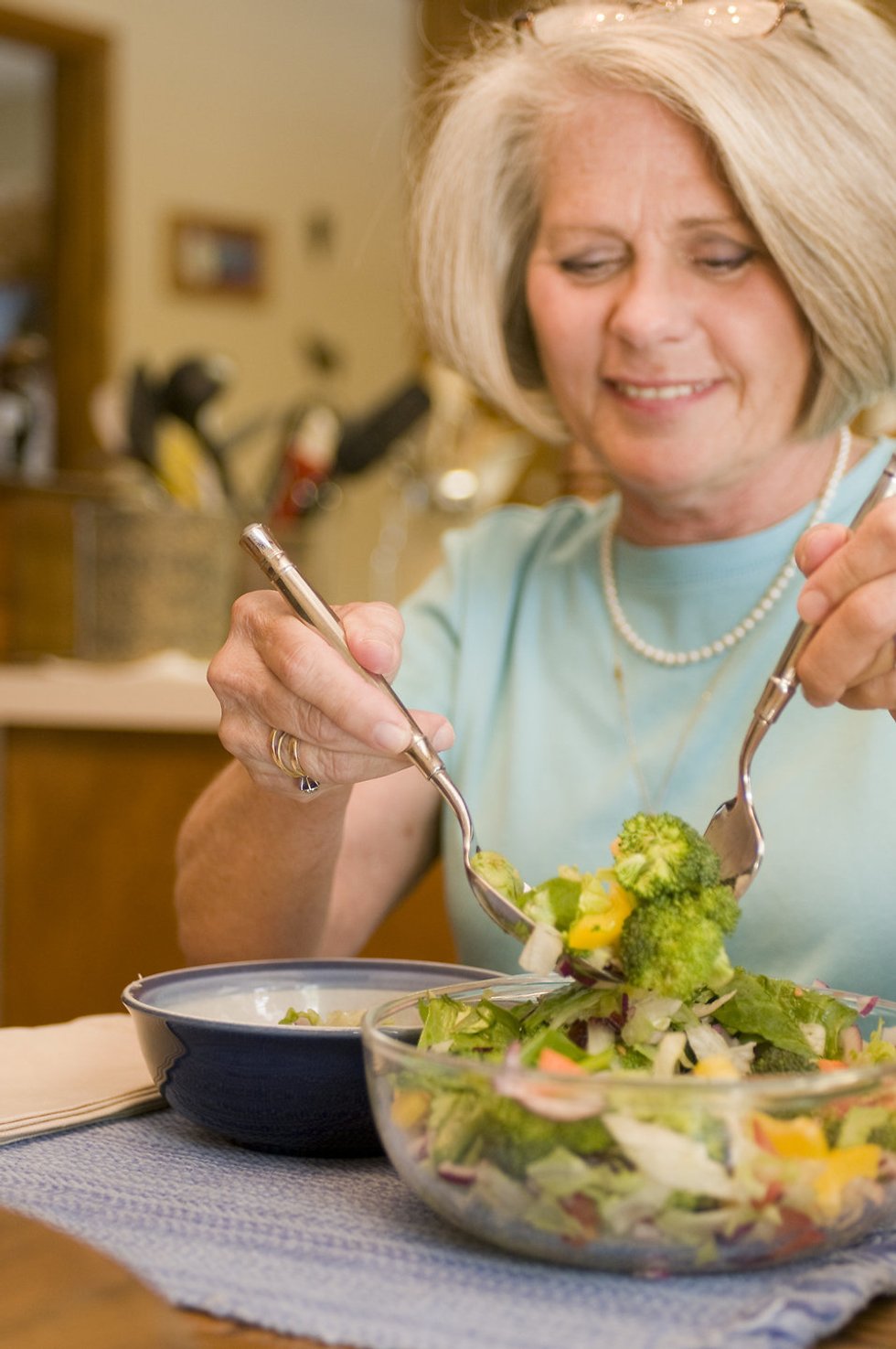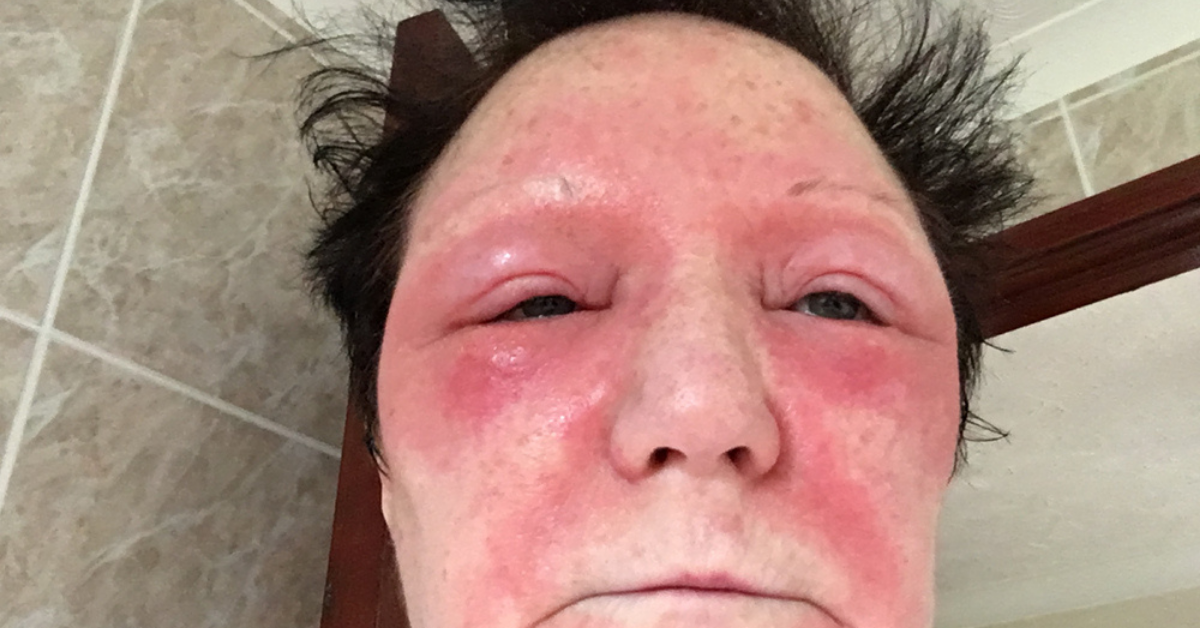A retired teacher whose self-esteem was shattered by an agonizing skin condition that made even blinking painful has praised a $14 cream for restoring her confidence.
Lynne Donnelly was enjoying a New Year holiday in Wales with her husband Mick in January 2016, when she woke one morning to find the skin around her eyes was red and sore.
When the mystery skin condition went away on its own she thought she had suffered a reaction to something, but it returned, coating her entire face in red patches and itchy welts throughout the year.

The condition, which is now thought by doctors to be a form of the skin complaint dermatitis, left Lynne in so much pain that even blinking would hurt, until she discovered an inexpensive cream through an online support group that she hails as a "miracle cure."
"I try to be a strong person, but when this condition developed all over my face, which I couldn't hide, it was really tough. At my worst, I didn't go out and didn't see people," she said.
"I did try to be sociable but, most days, I was in so much pain that even blinking hurt because my eyelids were so cracked."

When Lynne woke one morning during her New Year holiday in 2016 with bright red and extremely dry eyes, she thought she had simply “had a reaction" to something and had no idea of the horror that lay ahead.
"I hadn't used any different cosmetics, or used any of the products from the hotel I was staying at, so I had no idea what had caused it," she said.
Within a few days, the redness subsided and her skin returned to normal, only for it to flare up again the following month and disappear again without the need for treatment.

In April, she was hit by a reaction so severe that her face swelled up, as if she had an allergy.
"I wondered if it was a food allergy, but I couldn't think of anything different that I'd eaten," she said. "I ended up going to the emergency clinic, it was that bad."
Prescribing antihistamines and steroids, doctors advised her to document any further flare ups with photographs, so she had something to show her doctor.

"I did just that and was sent for some allergy tests, but they all came back clear. Nobody could find the cause for my flare ups. To this day, I still don't know what my triggers are," Lynne said.
Over the next year, Lynne became caught in a vicious cycle of flare-ups, for which she would take steroids and antihistamines. They would calm her skin until the next episode.
"I thought maybe that was the solution and that's what life would be – just constantly taking these antihistamines and steroids whenever my skin got bad," she said. “It did seem to calm things a little, at least."
But in April 2017, Lynne had her most extreme reaction to date – on which the steroids had little effect.
"It was almost as if they made things worse. I had them in topical form, but even applying the cream to my skin hurt," she said.
º"My doctor advised me to stop and was really supportive, but also said that he wasn't sure where to go next. It felt really quite desperate, having this condition that I didn't know how to make better."

"In a bid to find out what my triggers were, I cut out things like alcohol, certain foods and cosmetics. I actually stopped wearing makeup all together – it was too painful to apply," she said.
"Whatever I tried, nothing made a difference. My anxiety levels were high, yet I had no answers."
Taking matters into her own hands, Lynne went online and started scouring social media to find people like her.

On Facebook, she discovered a support group for dermatitis sufferers.
And, reading their stories, she realized just how closely their symptoms echoed her own.
"I mentioned the condition to my doctor and he agreed that it was very likely I had a form of dermatitis," she said. “It can cause the skin to become itchy, blistered, and dry – which was exactly what was happening to me."

"The pain is almost a tightening sensation across my whole face and then my skin cracks. I'd get these cold sore-like marks around my mouth, which made eating hard, as well as these raised welts that were so itchy they made sleep very difficult," Lynne continued.
Through her online support group, Lynne discovered scores of people extolling the virtues of zinc oxide power and calendula cream, both of which they claimed helped clear their skin.
Desperate to find a remedy, she bought herself some zinc powder and a pot of Lyonsleaf Calendula Cream, a 100% natural emollient designed to soothe skin conditions like acne, rosacea and certain forms of dermatitis.

"It did get worse before it got better, but within about four weeks, I definitely noticed a difference to my skin," said Lynne. "Within three to four months, I finally looked like me again."
Now, Lynne no longer uses zinc powder but continues to apply Lyonsleaf Calendula Cream throughout the day.
And she believes that the $14 “miracle" ointment has given her back her sparkle.
"I feel so much better now," she said. "All it took was for me to see a slight improvement in my skin, and then I was spurred on to keep going.
"Now, I go out and do all the things I want to do without worrying that people are going to stare at me. I'm not in pain anymore and haven't had a flare up since I started using the cream."

By sharing her story, Lynne wants to both thank Lyonsleaf and encourage others struggling with skin problems not to give up.
"It can be difficult to believe in other people's support when you're so low in confidence, but I'm so glad I did," she said.
"To anyone else out there I'd say keep going – you will find a solution."

"Stick to natural products that are free of chemical nasties, and work out a routine that is right for you," she concluded.
"But the main thing is don't give up hope."
 COMICSANDS
COMICSANDS percolately
percolately georgetakei
georgetakei secondnexus
secondnexus george's picks
george's picks












